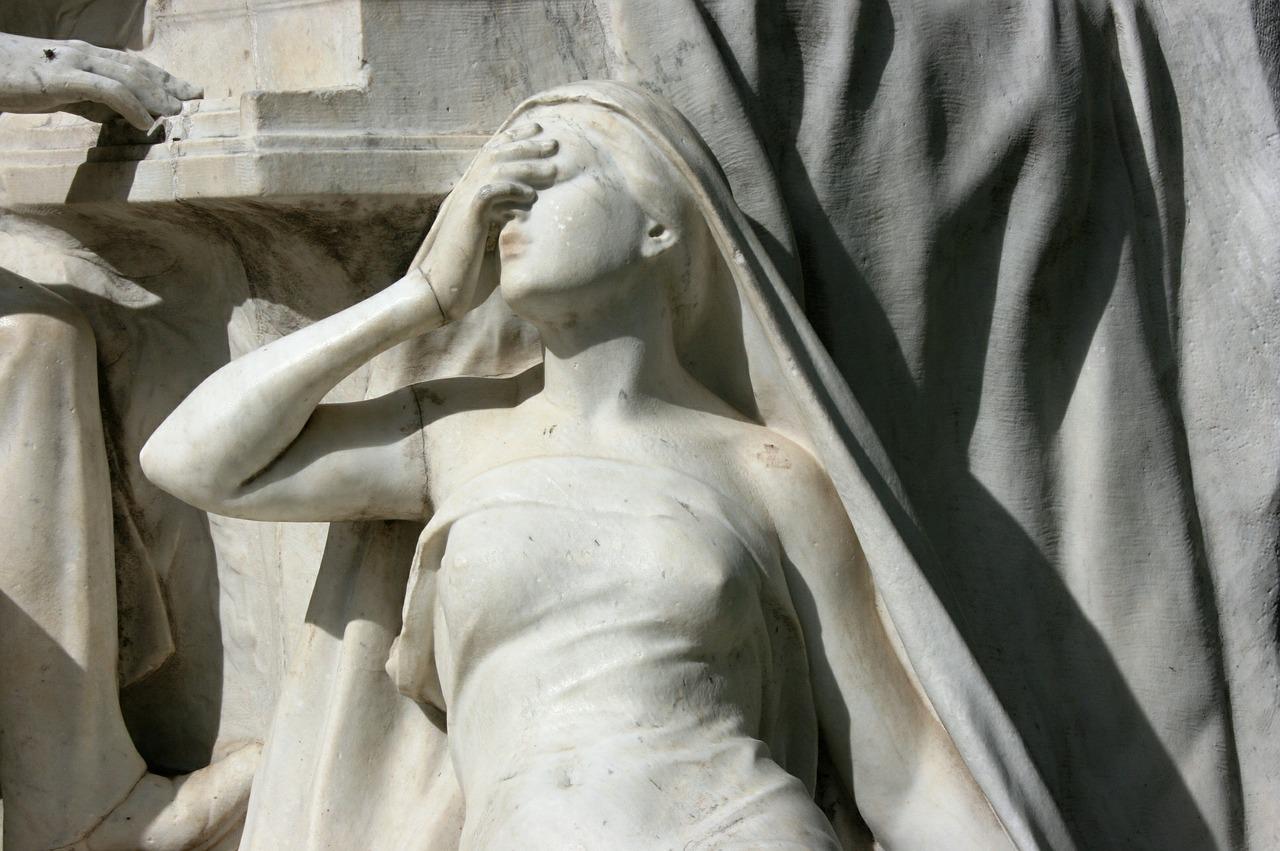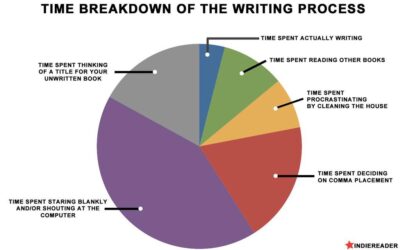I only write when inspiration strikes. Fortunately it strikes at nine every morning.
– William Faulkner
Ah…the muse. Isn’t she lovely when she strikes? Ideas erupt in our minds. Words pour forth onto the page. All as if we’re possessed by some mysterious creature. It’s a feeling like no other – flow at its finest, bringing with it a cascade of performance-enhancing, mood-altering neurochemicals (norepinephrine, dopamine, anandamide, serotonin, and endorphins to be precise). Ahhhh…
But, ohhhh, can the muse turn against us – disappearing completely or fading just out of reach, when we’re most yearning for her guidance. At these times, it’s difficult to decide if she’s actually a friend or foe.
That’s the question on my mind today: What to do about the ephemeral, temperamental muse?
There are two schools of thought on this topic. We are either dependent on her mercy, or we default to a forcing function, stepping into the role of taskmaster and brute forcing our way through daily word counts.
It turns out that neither of these perspectives is helpful to the writer seeking consistent inspiration. But don’t despair. Today, we’ll learn about the muse of three masters – indisputably successful authors who transform how we think about the tension between inspiration and discipline. But first, we’ll time-travel a bit and kick this adventure off with the birth of the Grecian goddess herself.

We think of the muse as a mythical source of inspiration who enriches writing and bestows creative ideas. And, indeed, she did emerge from Classical Greek mythology.
There were actually nine goddess-muses – the daughters of Zeus, who devoted themselves to encouraging creativity, enhancing imagination, and inspiring artists of all types. The sisters were depicted as ethereal women with divine beauty, who sang through the artist. It was a symbiotic relationship, both intimate and divine. Take heed: the artist merely animated the muse, who was credited as the actual creator. How’s that for some weird twist on plagiarism?
The sisters were also capricious, prone to jealousy, and resentful of humans foolish enough to challenge their superiority. Mortals always lost these competitions and were severely punished. Perhaps that’s how we got the idea that the muse can be fickle and…well…mean.
Because the muse held the real power in the relationship, Ancient Greek poets opened their epics by beseeching the muse to bestow them with creative storytelling prowess. Homer began both the Iliad and the Odyssey by invoking Calliope, the goddess of poetry and rhetoric, to help him tell his tales. She was the best known of the muses and I happen to adore her. She carries her writing tablet everywhere she wanders, much like I carry mine.
The idea of the powerful muse was turned on its head in the Romantic era, when poets like Shelley, Keats, and Wordsworth, replaced the idea of a God-like creature with a woman they could own, control, possess, and generally obsess over. Through her, the poet would extract his own creations – a little like a vampire. Sucking the life-blood out of a woman feels like a #MeToo moment to me. Ick.
Thankfully, the modern conception of the muse is absent of violence and appropriation. She’s envisaged as any source of inspiration albeit, as resources go, a mercurial, pain-in-the-ass. When the muse refuses to make an appearance, the agony of the void is visceral – comparable to the pangs of unrequited love.
Today, the notion of depending on an unreliable creative spirit is ridiculed, in favor of willpower, endurance, and productivity. Bestselling author Herman Wouk (known for his immersive historical novels, snappy dialogue, and psychologically-driven themes), once stated that he produced 2,000 words a day, through “an exceedingly difficult process of “gritting one’s teeth and putting down one word after another.”
Yes, Wouk was prolific but ewwww. That sounds like some form of torture.
There’s a better way.
Neither of these perspectives on the “right way to write” is productive or helpful – at least not for someone who wants to be prolific, professional, and passionate about their work. Each approach tried in isolation, has a severe limitation.
Brute force is soul deadening. “Gritting your teeth” to get work done is the route to the ‘miserable-artist’ persona rather than a pleasurable life. It may lead to increased output but where’s the soul? Readers can feel the absence of inspiration.
And then there’s the muse. She is a necessary partner in the creative process, but if we sit around and wait for her, she may never show up at all.
The secret here is that discipline doesn’t have to be a dirty word. It doesn’t need to mean “ass in the chair.” Writing doesn’t need to take place at a desk. That may be where words congeal on a page, but inspiration strikes through action.
As I explored the creative process of some of my favorite writers, I learned that their best ideas came from a discipline that had nothing to do with writing. They were devoted, almost religiously, to things like walking in nature, gardening, or having conversations with people. Routines involving motion can become a lever to summon the muse.
Learning from the Leaders
Today, we’ll look at poetess extraordinaire, Mary Oliver, as well as two kings of the non-fiction page-turner, Michael Lewis and Michael Pollan. These masters of their craft summon their muse reliably. Each developed pleasurable rituals that fit their lifestyle and free their mental energy. When they engage in these routines, they find themselves flooded with ideas. And isn’t that what we’re after?
The key parallel among these three writers: motion summons the muse. Their devotion to a consistent habit that moves the body and mind lets them tap into an endless well of inspiration. Understanding their tools and rituals will change the way we think about the word, “discipline.”
Mary Oliver Communes with Nature & Notepads
Mary Oliver (1935-2019) wrote more than 25 books of poetry and prose. She won both a Pulitzer and a National Book Award, but even more striking is her role as the people’s poet. In 2007 the NY Times reported that Oliver was “far and away, this country’s best-selling poet” and she no doubt still holds that honor. Upon her death in 2019, the entire world mourned.
Inspiration struck Ms. Oliver reliably at around 5:30 AM, though her routine was the opposite of ‘ass in chair.’ She arose in the wee hours each morning for her ‘daily constitutional’ – her long walk in nature. Whether wandering the woods near Cleveland in her youth or combing the beach of her adult Provincetown home, her ritual was sacrosanct.
Ms. Oliver’s distaste for the indoors stems from abuse in her childhood home, which often sent her on long walks in the woods. From a young age, she sought refuge in nature, in poetry, and in motion. She “scribbled things” as they came to her and later worked those notes into poems.
Oliver’s approach to writing shows how inspiration can be found away from the desk. Her passion for repeatedly visiting the same locations in nature reflects her continual search for change, meaning, and mystery. There were no blank pages or forced “imaginings” for Oliver. Through wandering and observing, her muse arrived, and she had her notebook ready to record the stream of ideas that poured out. At her memorial, her friend, Bill Reichblum shared, “She modeled a way to engage the world. Not to demand, but to ask. Not to be all-knowing, but to always be curious. And not to wallow in the past or be focused on the future, but to be present.”
Oliver never had to force herself to write. Her ideas emerged from her devotion to nature and writing was simply her means of expression. In Mindful, Oliver captures her passion for experiencing the mystery in the mundane. She begins the poem by describing her process:
Everyday
I see or hear
something
that more or less
kills me
with delight,
that leaves me
like a needle
in the haystack
of light.
It was what I was born for —
to look, to listen,
to lose myself
inside this soft world —
to instruct myself
over and over
in joy,
and acclamation.
Oliver’s muse was an inspiration born of daily discipline. But brute force, “ass in the chair” would have felt like perpetuating her childhood abuse. Instead, her discipline was akin to devotion. It involved a gentle ritual of beauty, presence, and oneness with nature. Her tool-of-the-trade was simple and analog: a small notebook and a pen. A simple but reliable ritual allowed her to capture the unnoticed as well as the unimaginable and share these visions with the world.
Like Mary Oliver, I wander the world paying close attention. Most of my “writing” is done far from a desk, wandering around the wilds, wherever I find them.
Recently, during a hike in the burnt grasslands of drought-stricken northern California, I was struck with the kind of inspiration I could never find in my Chicago home office. Inspired by Oliver, I was present, in the moment, and absorbed in my surroundings.
In my wandering, I came across a tiny flower making a valiant attempt to grow all by itself, straight from a stone. And I thought “Yes, I’ve felt that way. I can relate.” My muse arrived. Insights and ideas spilled out of me as I walked. I captured them through the miracle of voice-to-text transcription and later turned them into an ode to a solitary wildflower.
This was a transcendent experience. I realized that this flower’s aloneness was simply an illusion. It seemed to have no support, no soil, no foundation. Yet, underneath the stone, there was a wild connection – a network of nurture. And, in the same way, none of us are as alone as we can sometimes feel. Suddenly, instead, I could feel the interrelatedness of all things. And I could express them…in words…and share them with my readers.
Oliver advised us to revel in nature, attend and investigate, and most importantly, write through movement. My advice is simply an updated version. My ‘notebook’ is my phone, and my words are ‘scribbled’ vocally, into Otter, my transcription app. I invite you to do the same. Get out there, move your body, notice everything, and speak your mind.
Michael Pollan Engages the Elements in his Mind and his Garden
Michael Pollan, professor at UC Berkeley’s Graduate School of Journalism and bestselling nonfiction author, may be most famous for his nutritional prescription from In Defense of Food: “Eat food. Not too much. Mostly plants”. Sound and simple advice, it caught on like wildfire.
Pollan started out writing about gardening, then turned to the socio-cultural impacts of food, food production, and nutrition. Later, he single-handedly brought plant medicine and psychedelic-assisted psychotherapy into the public eye. This guy is into plants!
As a budding gardener, he stumbled on two gardening philosophies, both of which seemed extreme: dominate the land or just give into it. Sound familiar? This prescription parallels our supposed choices with the muse: brute force vs passive acceptance of her will. Just as we’re doing with writing, Pollan sought a middle path with his garden – one that allows for both wilderness and rituals that corral the wilds. “The gardener cultivates wildness, but he does so carefully and respectfully, in full recognition of its mystery.”
Gardening is no easy task and neither is writing. Interestingly, Pollan says that he learned how to write and garden from the same man: Wendell Berry – farmer, poet, novelist, and activist.
It’s not surprising then, that Pollan finds his muse in the garden. He describes gardening as the perfect activity to engender creative thought because it’s active and immersive but doesn’t require full attention. Unlike something dangerous like woodworking, the physical activity becomes automatic, and there’s room for the mind to wander. Since his garden is his church, it’s no surprise that this is where his muse resides.
I laughed uncontrollably, listening to him describe his existential crisis while mowing the lawn: Am I the proverbial hero, overcoming the forces of nature? Or are these blades of grass the true heroes, battling the elements (me)? Questions only a writer-philosopher-gardener would ask.
Tending to his yard ignites an unending stream of spiritual questioning. Julia Cameron, author of the creative’s manifesto, The Artist’s Way, said, “A gardener doesn’t create a tree. A gardener plants a seed and then he takes good care of it, hoping it’ll one day bloom and turn into a big, beautiful tree.” As Pollan sows seeds in his garden, hoping they will bear fruit, ideas for essays and books naturally sprout in his mind. He’s devoted to his garden so it’s easy to show up every day.
Gardening doesn’t speak to me, but I have my own immersive rituals, including the morning ceremony I refer to as ‘web clearing.’ It’s a whole thing. First, I clear my mental cobwebs by brewing the perfect cup of tea. This involves, quite literally, ‘watching the pot boil,’ eventually drenching leaves with the warmed water, and finally adding my own flourish (ice cubes).
Then, I journey to my balcony, with its sliver-view of Chicago’s great lake and towering skyline, to wipe away the physical cobwebs left by a band of intrepid spiders. Once that’s done, I write.
This type of humdrum, everyday routine summons my muse. I’m devoted to my morning ritual, and since I do it so often, it happens automatically. It gives me a chance to be present, and ideas come to me without trying. Thanks to my special form of ‘gardening,’ words pour forth when I flip open my laptop, as though what was brewed was my essay rather than my tea.
I encourage you to attend to your thoughts while in the midst of your routines and hobbies. And while you’re at it, make sure to keep Otter nearby. A hands-free means for capturing your thoughts mid-cultivation of a plant or a brew makes it easy to build a repertoire of ideas for future development.
Michael Lewis Uncovers Inspiration through Ideas and Interaction
Writer’s block is common but talker’s block is nonexistent.
– Seth Godin
Michael Lewis is one of the most prolific and successful nonfiction writers of our time. He’s published eighteen best-selling books, three of which have been made into critically acclaimed movies (The Big Short, Moneyball, and The Blind Side). His interests run the gamut from exposing the exploits of investment bankers (Liar’s Poker) to lauding the public health heroes of the COVID-19 pandemic (The Premonition). Humorously, when asked if there’s anything he won’t write about, his response was, “Plants. I don’t have much interest in plants…my rule is ‘never bore myself!’” (Sorry, Michael Pollan.)
Yet, in terms of writing, Lewis was a late-bloomer. While he enjoyed writing his college thesis, his chair’s career advice was discouraging (basically, ‘keep your day job’). Dismissing this guidance, he submitted magazine articles for years, until his witty wordcraft about his actual day job (investment banking) landed him a contract. Later on, his friend and UC Berkeley professor, Ramona Naddaff said that it was Lewis’s curiosity that led him to improve as a writer and to discover fascinating stories that would enthrall the world.
Lewis simply must understand everything and everyone. His compulsive curiosity is clearly his driver. His questions propel him into dialogue with others. That’s where his ritual and the magic unfolds. We learn from him that motion is sometimes mental.
Though subjects claim they can’t see the method to Lewis’ madness, there’s clearly a dogged discipline to his process. He notes, “The process is so messy that no business school or writing program would teach it. I just wander… I try to encounter experiences in print, on the internet, at dinner parties, and at conferences. I try to put myself in situations where I talk to people about many different aspects. When I find something that I am immensely interested in, I look to write something about it and see where it goes.”
“I think to the extent there’s a secret [to my writing process], it’s that I really take unbelievable pleasure in these people. And I’m just trying to share – let the reader share – in that pleasure. I want you to have the experience I just had. You’ve got to get to know this person and this person is going to teach you about a lot of things, too, by just being with them. I want you to feel what that’s like.”
Lewis is the poster child for David Perell’s concept of “writing from conversation.” Early-stage writers tend to overcomplicate the writing process. Since people have more experience and ease with conversation, dialogue reduces complexity.
“Writing from conversation” is like injecting growth hormones into an idea. When curious creatives gather for a chat, it’s best done with a recorder running and a notebook in hand! Through discussion, ideas tend to sprout branches and before long, a single stalk becomes a jungle of material.
My own Lewis-esque muse comes in the form of ‘writing from conversation’ with people who bring me “unbelievable pleasure.” Three separate groups deserve mention.
Every weekday morning, I meet with my muse, Mike Newton. We ramble about sleepless nights, bizarro dreams, our equally-passionate forms of tea-fetish, the process of writing, or a particular piece that’s in the throes of labor. Then, off we go to write separately before reconvening to debrief. We keep each other honest and engaged with our writing. We also offer compassion and guidance when things aren’t going well. We’ve built a space that’s simultaneously stimulating and safe.
In my weekly accountability group, we share our accomplishments, challenges, and commitments. Then, on Sundays, I meet with the women-of-WoP (friends discovered in David Perell’s Write of Passage course) on Zoom sessions to exchange feedback on new ideas.
There’s a theme here: Conversation engenders new perspectives and inspiration to create. The simple, magical formula for accountability groups is thus: talk → write → talk. And don’t forget Otter (they should so be paying me for this essay!). I record most of my own ideas during these discussions so that I can preserve the feedback I receive and my own turn of phrase.
For eight months, I’ve met with Mike daily. My weekly accountability group has thrived for over two years! These anchors are key to my writing process and progress. We’re inspired to show up, support each other, and put in the work. This is an act of devotion and never feels like discipline.
Community is available to everyone these days and it’s noteworthy that all my meetings are online. Not to belabor the obvious, but Write of Passage – also an online course – is not simply a writing school. It provides a lifestyle change brimming with community, for those who invest the time and energy.
Conclusion
Creativity is imagination having fun.
– Albert Einstein
I love Einstein’s quote but it sometimes feels like a fantasy. Creativity is often difficult to access on demand and, at those times, it’s the antithesis of fun.
Inspiration can feel elusive but, in the end, Einstein had the right idea. Creating can be a pleasurable process if we learn how to summon and dance with that ephemeral creature: the muse.
Writing isn’t a sedentary activity, nor is it an act of isolation. Walking in nature can spark insights. Automatic chores give our minds space to wander. Conversations give us new perspectives. To summarize: motion is the fuel of the creative engine.
When you feel blocked, you have a choice. Instead of punishing yourself for the sake of output, you can nourish yourself. Create rituals that work for your lifestyle, speak to your soul, and reflect your passions. Engage in those rituals religiously. That kind of discipline-turned-devotion provides a spark for your work so that you can be the vessel for your muse.
Julia Cameron has said, “The minute you stop thinking of yourself as an idea generator and instead see yourself as a vessel that ideas just happen to flow through as you find them out in the world, you take all the creative pressure off.”
I don’t force myself to hit a word count or to maintain a publishing cadence. Instead, I ensure that I spend time in nature, prepare my tea, and sync up with my writing friends. Inspiration arrives without effort.
In I Sing the Body Electric, Walt Whitman swims in a sea of inspiration. The point is once again driven home: there’s no need to actively force anything into being. Instead, cultivate disciplines in your life that make your heart sing and experience the sublime effects. In the process, your muse appears through motion and your discipline transforms into devotion.
I sing the body electric,
The armies of those I love engirth me and I engirth them,
They will not let me off till I go with them, respond to them,
And discorrupt them, and charge them full with the charge of the soul.
…
I have perceiv’d that to be with those I like is enough,
To stop in company with the rest at evening is enough,
To be surrounded by beautiful, curious, breathing, laughing flesh is enough,
To pass among them or touch any one, or rest my arm ever so lightly round his or her neck for a moment, what is this then?
I do not ask any more delight, I swim in it as in a sea.





0 Comments